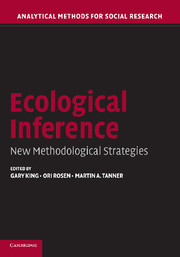Book contents
- Frontmatter
- Contents
- Contributors
- Preface
- INTRODUCTION
- PART ONE
- PART TWO
- PART THREE
- 9 Ecological Inference in the Presence of Temporal Dependence
- 10 A Spatial View of the Ecological Inference Problem
- 11 Places and Relationships in Ecological Inference
- 12 Ecological Inference Incorporating Spatial Dependence
- PART FOUR
- Index
12 - Ecological Inference Incorporating Spatial Dependence
Published online by Cambridge University Press: 18 May 2010
- Frontmatter
- Contents
- Contributors
- Preface
- INTRODUCTION
- PART ONE
- PART TWO
- PART THREE
- 9 Ecological Inference in the Presence of Temporal Dependence
- 10 A Spatial View of the Ecological Inference Problem
- 11 Places and Relationships in Ecological Inference
- 12 Ecological Inference Incorporating Spatial Dependence
- PART FOUR
- Index
Summary
ABSTRACT
Ecological inference for a series of 2 × 2 tables suffers from an inherent lack of identifiability. Any attempt at a solution to this inferential problem must either (a) incorporate additional information or (b) make assumptions. Without further information and given the data in the margins alone, critical assumptions, such as that of no contextual effects, remain untestable. This suggests a strategy of reporting a series of models based on a range of plausible assumptions, and thus performing a sensitivity analysis with respect to the untestable assumptions. The work of this paper is motivated by a voter-registration example from the U.S. state of Louisiana in 1990, where each 2 × 2 table represents one of 64 parishes. When aggregation is on the basis of geography, as in our example, it is intuitive that spatial effects may have a role in an ecological inference analysis. Thus far, such a role has received little attention in the literature. In this paper, we draw on the spatial epidemiological and biostatistical literature and consider the inclusion of a hierarchical spatial model into a sensitivity analysis for ecological inference. We outline issues regarding specification, interpretation, and computation for this particular model when applied to the Louisiana example. A small simulation study suggests that, in the presence of spatial effects, traditional approaches to ecological inference may suffer from incorrect estimation of variability, while models that explicitly allow for spatial effects have generally better performance.
Information
- Type
- Chapter
- Information
- Ecological InferenceNew Methodological Strategies, pp. 266 - 302Publisher: Cambridge University PressPrint publication year: 2004
Accessibility standard: Unknown
Why this information is here
This section outlines the accessibility features of this content - including support for screen readers, full keyboard navigation and high-contrast display options. This may not be relevant for you.Accessibility Information
- 12
- Cited by
